Charlie Whiting: F1 race director dies aged 66 on eve of season-opener in Melbourne
- Published
- comments
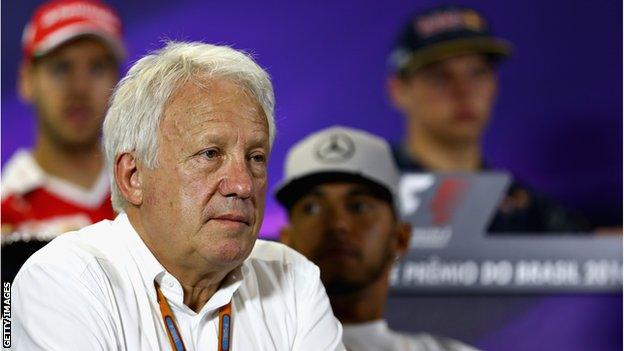
Whiting's involvement in Formula 1 spanned five decades
Charlie Whiting, the head of Formula 1 for motorsport's governing body the FIA and one of the most influential people in the sport, has died aged 66.
Whiting suffered a pulmonary embolism, external on Thursday morning in Melbourne, where he was due to officiate this weekend's season-opening Australian GP.
Whiting was the official race starter and oversaw all rules matters in F1.
FIA president Jean Todt called Whiting "a central and inimitable figure who embodied the ethics and spirit" of F1.
Whiting had worked for the FIA since 1988, when he joined initially as technical director.
He was previously chief mechanic and then chief engineer of former F1 boss Bernie Ecclestone's Brabham team, which won world championships in 1981 and 1983.
Whiting began his F1 career with the Hesketh team in 1977, moving to Brabham for 1978 and staying there until he joined the FIA, where he had been a central part of the organisation's running of F1 ever since.
Todt added: "Formula 1 has lost a faithful friend and a charismatic ambassador in Charlie."
Ex-team boss Ross Brawn, now F1's managing director, said: "I have known Charlie for all of my racing life. We worked as mechanics together, became friends and spent so much time together at race tracks across the world.
"I was filled with immense sadness when I heard the tragic news. I'm devastated. It is a great loss not only for me personally but also the entire Formula 1 family, the FIA and motorsport as a whole. All our thoughts go out to his family."
Whiting's death leaves a hole at the FIA - he was the go-to person for teams on all matters pertaining to an F1 weekend.
Australian Michael Masi will take Whiting's place as race director, safety delegate and permanent starter this weekend in Melbourne.
Masi has been race director of Australia's V8 Supercars series for the past four years.
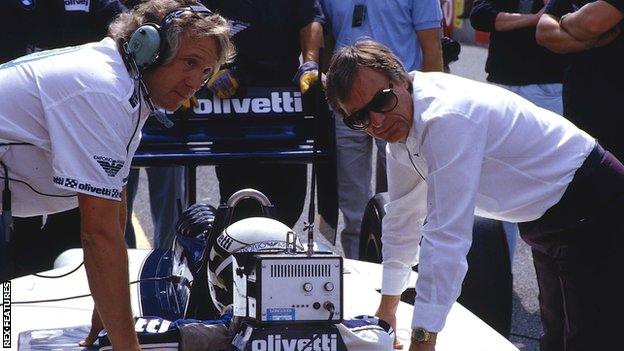
Whiting worked closely with ex-F1 supremo Bernie Ecclestone for decades. This picture was taken at the 1986 Italian Grand Prix, when Whiting (left) served as Ecclestone's chief mechanic at Brabham
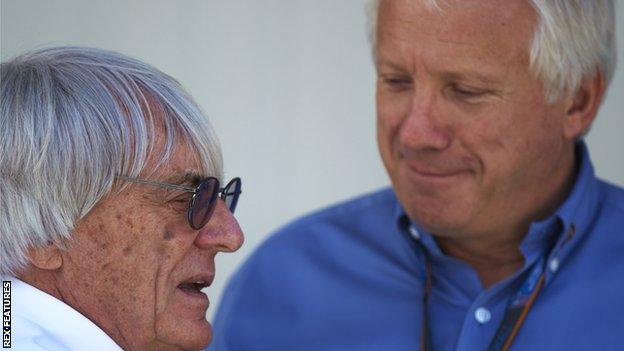
Whiting was one of Ecclestone's closest allies and the two would go on to become hugely important figures in the management of the sport
An 'iconic figure', 'a very nice guy' - F1 tributes
Reigning world champion Lewis Hamilton, who had known Whiting since starting out in F1 in 2007, told BBC Sport he was "incredibly shocked to hear the sad news".
"What he did for this sport, his commitment, he really was a pillar. Such an iconic figure and he contributed so much."
Ferrari's Sebastian Vettel said he had spoken to Whiting on Wednesday: "I walked the track for the first couple of corners with him. It is difficult to grasp when someone is just not there any more.
"He has been our man, the drivers' man. There's the regulation and then us, and he was the middle man. Any time his door was always open. He was a racer, just a very nice guy."
Robert Kubica, who drives for Williams, said: "It is a hard moment. I saw Seb walking with Charlie yesterday and thought I would not interrupt them. He was a kind of icon of F1, but not only F1. He was a racer, keeping up everything in the regulations, he was the kind of person where you can always trust and commit."
Red Bull's Max Verstappen added: "It was a big shock, also because I spent like a day with him in Geneva a few weeks ago. I guess you just have to realise that every moment you wake up and enjoy life."
Daniel Ricciardo, now with the Renault team, said he was "taken aback" by the news.
"He was there for us and we gave him a hard time, we'd really press him and push him and make him work, but he was always really receptive, you always felt like he was on our side.
"Time goes fast and it's important to appreciate it. We'll all race with a lot of passion this weekend and it's just a reminder we are all very lucky to be in this position."
Mercedes team boss Toto Wolff described Whiting as a "fantastic ambassador for our sport and a true guardian of its best interests".
The McLaren team paid tribute to Whiting, tweeting:, external "All at McLaren are shocked and deeply saddened at the news of Charlie Whiting's passing. Charlie will be remembered as one of the giants of our sport, as well as a great colleague."
Red Bull Racing, external said the team was "shocked and saddened" at the news. Team principal Christian Horner added: "Charlie has played a key role in this sport and has been the referee and voice of reason as race director for many years.
"He was a man with great integrity who performed a difficult role in a balanced way. Charlie was a great man who will be sadly missed by the entire Formula 1 paddock and the wider motorsport community."
Renault, external described him as "one of the pillars and leaders of the sport".
'Lightness of touch & ready sense of humour' - analysis
Charlie Whiting was a giant personality in F1, and it is hard to emphasise just how big a hole his death leaves in a sport in which he has been a central figure for 40 years.
As the FIA's F1 director, Whiting was the go-to man for all aspects of the sport - he was involved in everything, from safety, to technical rules to sporting matters.
He certified circuits, he led the drivers' briefings, he pretty much wrote the rules by himself, and he did all this with a lightness of touch, approachability and ready sense of humour that made a man doing one of the most difficult jobs in F1 one of its most popular characters.
Whiting was the ultimate poacher-turned-gamekeeper. Brabham, when he was there, were notorious for stretching the rules to breaking point - and sometimes beyond. And he would happily engage in light-hearted badinage about some of the more infamous stories.
At the Brazilian Grand Prix one year recently, Nelson Piquet's 1981 title-winning Brabham was being demonstrated by its former driver.
The car was notorious for taking pole at Monaco in 1981, only for the mechanics to fit a much heavier rear wing - which needed three of them to carry it - to ensure it was over the minimum weight limit afterwards.
This writer joked to Whiting that I'd just seen "that illegal 1981 Brabham that took pole at Monaco". He replied with a cheeky smile: "No, you haven't. You've just seen the perfectly legal one that ran later on."
His knowledge of the wiles of F1 teams was invaluable in the role he was given by the FIA in 1988 - on the recommendation of Ecclestone, his former team boss, who had by now relinquished control of Brabham and was running the commercial side of the sport.
And he went on to make that role his own, later expanding his position as technical delegate into race director and then responsibility for all aspects of F1 for the FIA.
Whiting combined unquenchable energy, something close to workaholism and an easy manner to run the most complex of sports in a way that ensured inevitable controversies were always handled in a manner that avoided rancour.
He was incredibly busy, but generous with his time, the warmth of his personality and love for the sport always shining through.
From the FIA's point of view, he will be incredibly difficult to replace. And, just as with Ecclestone, it may well be that several people are needed to manage all the different responsibilities that he had handled so deftly for so long.
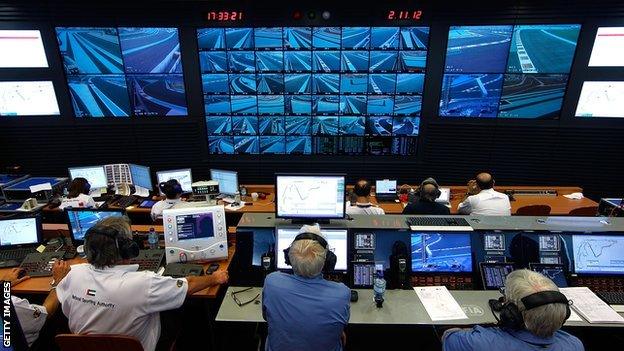
Whiting's role included starting each grand prix, overseeing track and car safety, and technical and procedural matters on race weekends
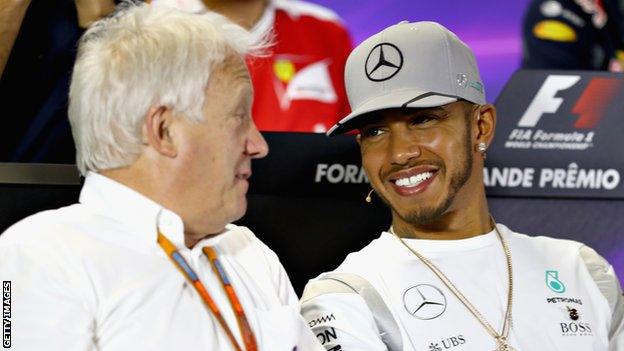
Whiting pushed for improved safety standards in the sport and was a popular figure among the drivers
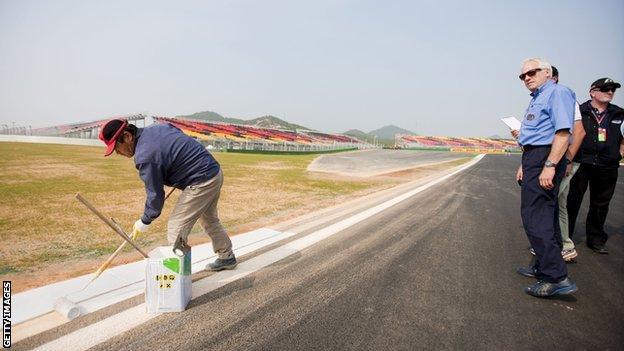
Track safety inspections were a key part of Whiting's role, as here at the 2010 Korean Grand Prix